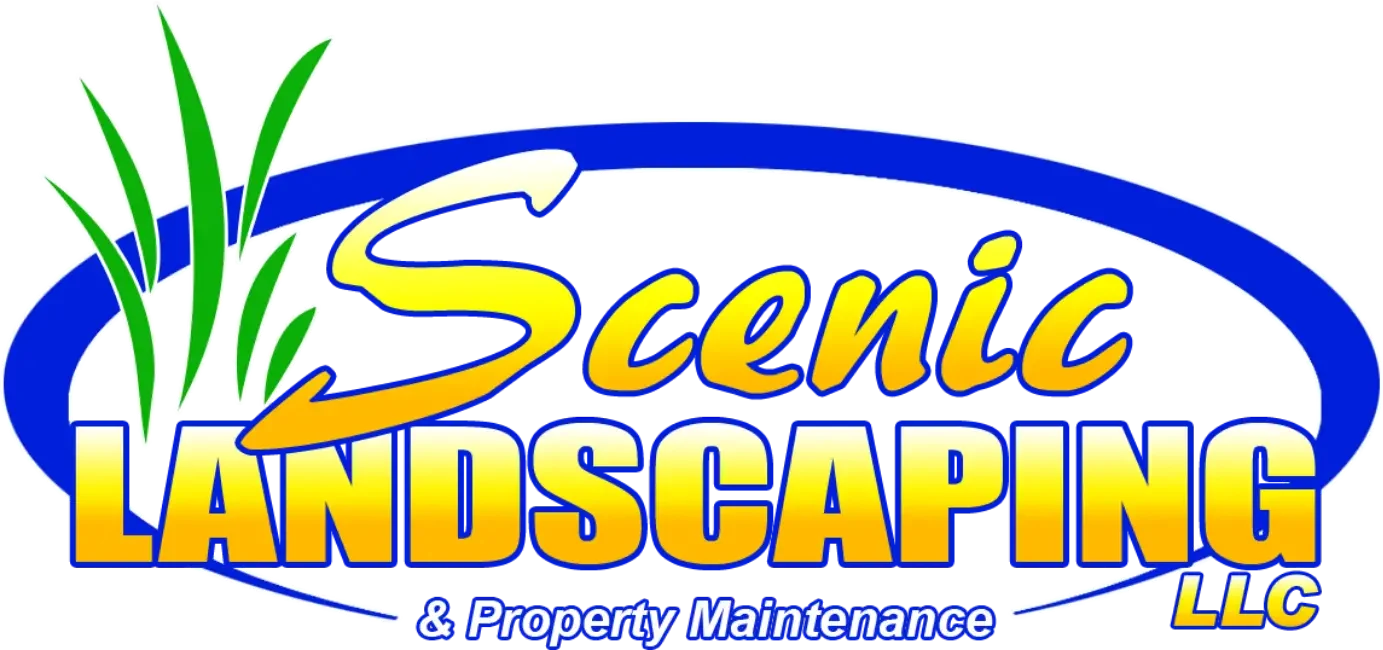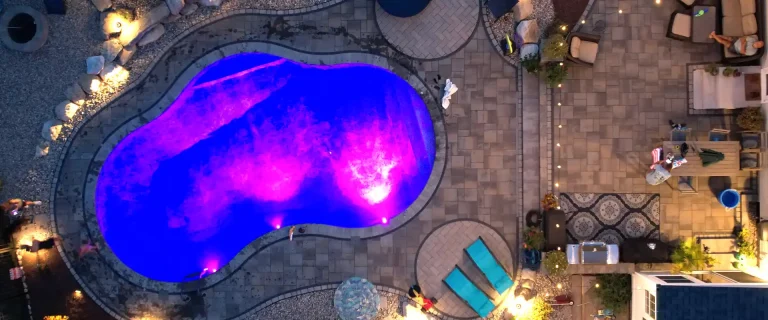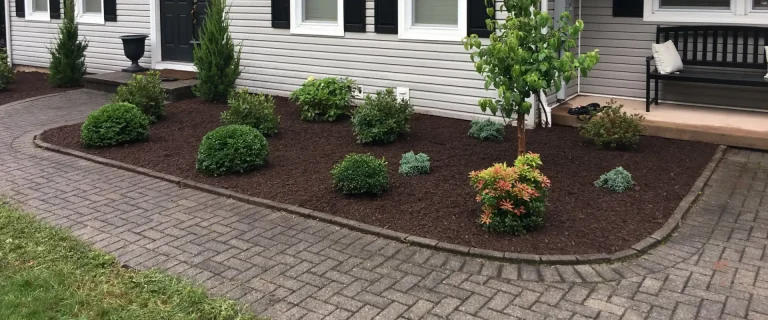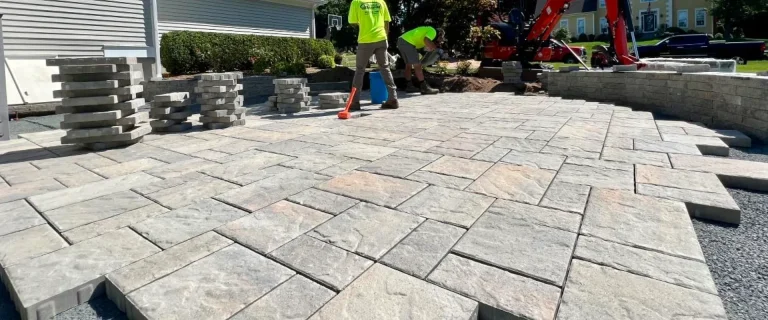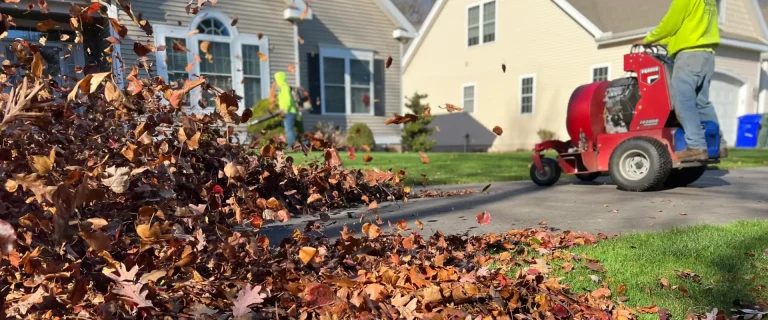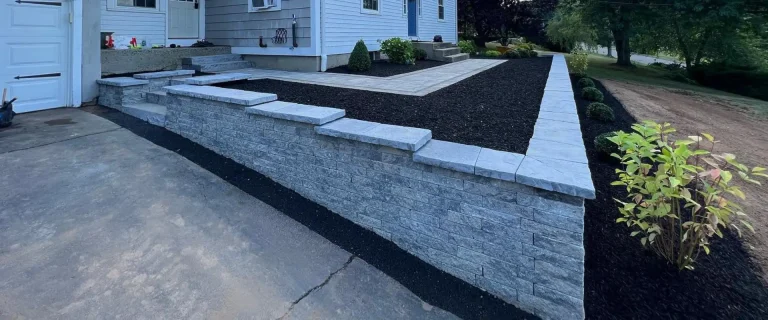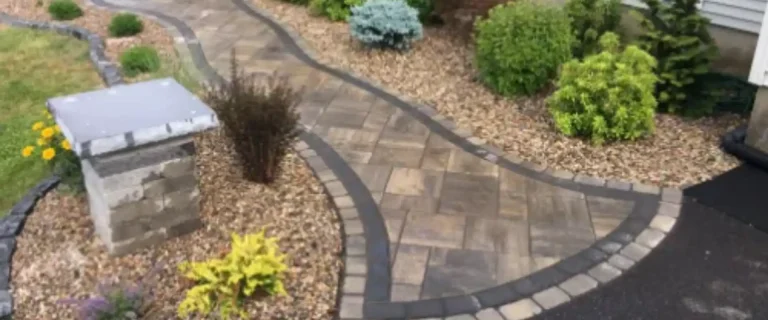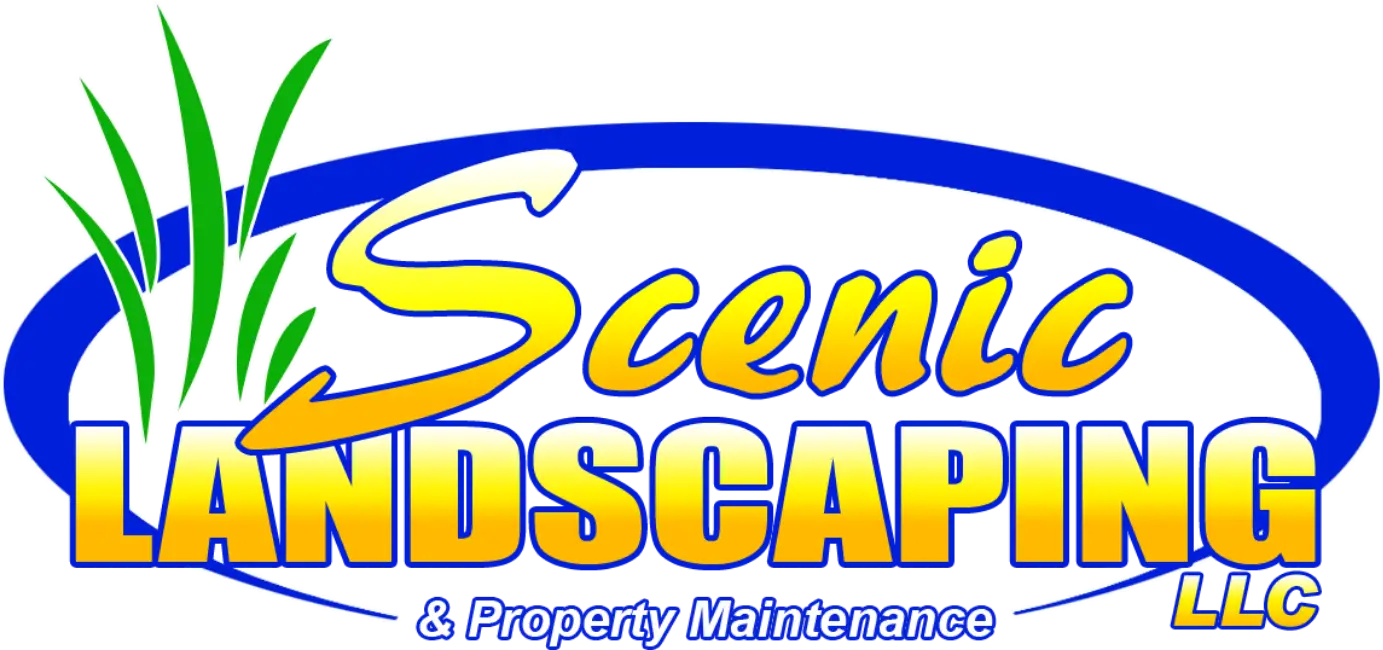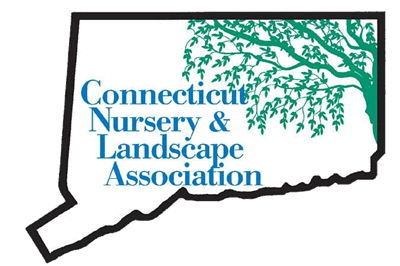Drainage Swales vs. French Drains: Which is Best for Your Property?
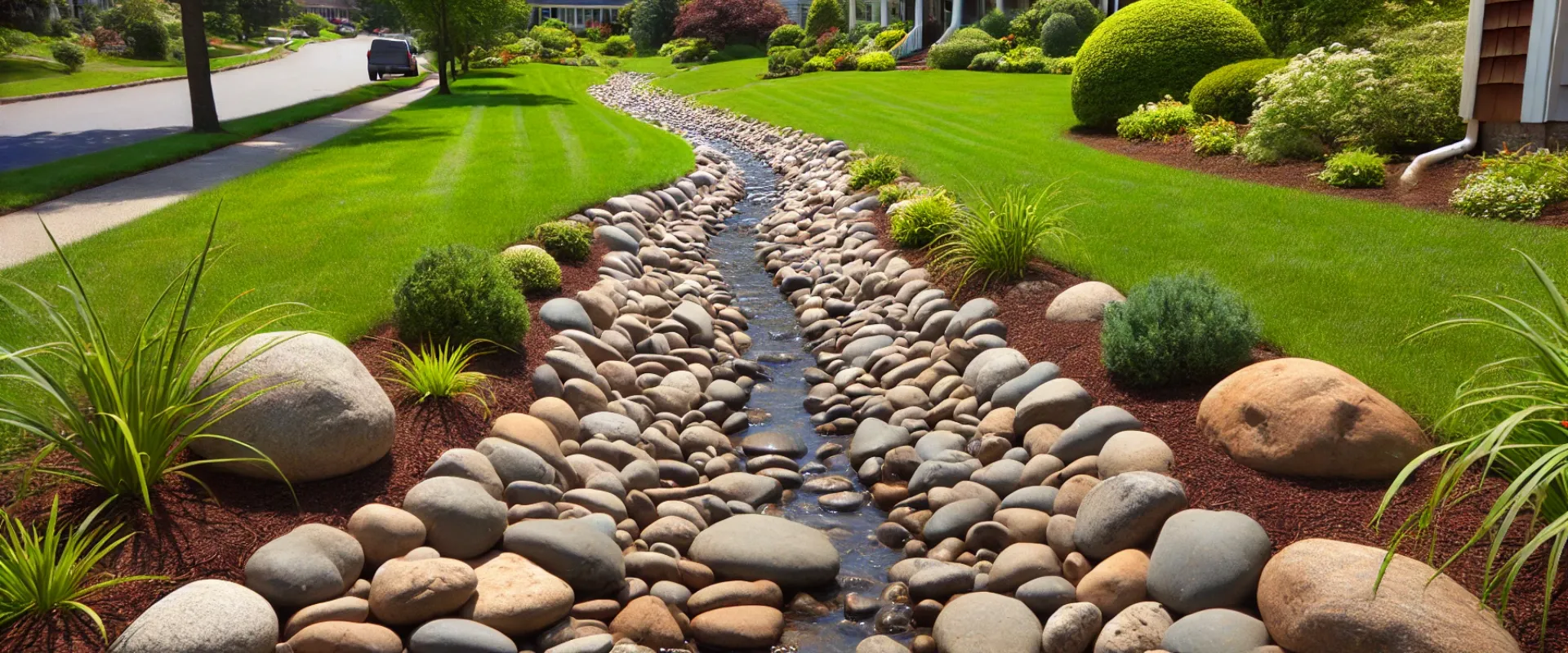
If you're a homeowner in Rocky Hill, CT, or surrounding areas like Glastonbury, Wethersfield, and West Hartford, dealing with water drainage problems can be a real headache. Whether it's standing water in your yard after a storm, erosion washing away your landscaping, or water pooling near your home’s foundation, these issues can lead to more serious problems like mold, structural damage, or costly repairs. Fortunately, there are two effective solutions to these drainage problems: drainage swales and French drains.
Both of these systems are designed to manage and redirect water, but they work in different ways, come with varying costs, and require different levels of maintenance. In this article, we’ll break down the differences between drainage swales and French drains to help you make an informed decision on which solution is best for your property.
What is a Drainage Swale?
A drainage swale is essentially a shallow, gently sloped channel that redirects water runoff away from your home or problem areas in your yard. Swales are often lined with grass, plants, river rock, or gravel to help slow down the water flow, allowing it to gradually soak into the ground. In some cases, swales are designed as bio-swales, incorporating plants that naturally filter out pollutants from the water, making them an eco-friendly choice.
How Drainage Swales Work:
- Water is funneled into the swale, typically from a roof downspout or driveway.
- The swale slows down the water and guides it to a designated drainage area, like a rain garden or retention pond, or back into the soil.
- The combination of grass, mulch, and soil helps filter out contaminants as the water slowly infiltrates the ground.
Advantages of Drainage Swales:
- Cost-Effective: Swales are relatively inexpensive to install compared to more complex drainage systems. They are especially ideal for large properties with natural slopes.
- Natural Appearance: Swales can be designed to blend seamlessly into your landscape. By incorporating native plants and stones, a swale can become an attractive feature in your yard.
- Eco-Friendly: Bio-swales, in particular, help filter pollutants from runoff water before it enters local waterways, improving overall water quality.
- Low Maintenance: Once established, a drainage swale requires little maintenance other than occasional mowing and ensuring that it remains free from debris.
When to Consider a Drainage Swale:
- Your property has naturally sloping terrain.
- You experience mild to moderate water pooling in your yard.
- You’re looking for a visually appealing, eco-friendly drainage solution.
- You want to improve water filtration and reduce runoff pollution.
What is a French Drain?
A French drain is a perforated pipe installed underground to redirect water away from problem areas. The pipe is typically buried in a gravel-filled trench, and excess water is collected through the gravel before being funneled into the perforated pipe. The water is then carried away to a drainage outlet, such as a storm drain, retention pond, or lower part of your yard. French drains are highly effective in handling larger volumes of water, particularly in areas with heavy rainfall or poor soil drainage.
How French Drains Work:
- Water collects in the gravel-filled trench and seeps through the gaps between the gravel.
- The water then enters the perforated pipe, which is typically sloped to encourage the water to flow downhill.
- The pipe carries the water to a designated drainage point, such as a dry well, pond, or municipal storm drain.
Advantages of French Drains:
- Effective for Heavy Water Flow: French drains can handle significant amounts of water and are ideal for areas prone to heavy rainfall or properties with poor drainage.
- Hidden System: Since French drains are installed underground, they don't interfere with your landscape design and are virtually invisible once installed.
- Versatile Installation: French drains can be installed along foundations, under patios, or in areas prone to flooding. They’re often used to prevent water from seeping into basements or crawl spaces.
When to Consider a French Drain:
- You experience significant water pooling or flooding in your yard.
- You need to protect your foundation from water damage.
- You have areas of poor drainage or hard soil that doesn’t easily absorb water.
- You want a solution that is out of sight and won’t affect the appearance of your yard.
Drainage Swales vs. French Drains: A Comparison
Now that you understand how both systems work, let’s compare the two solutions across key factors: functionality, cost, and maintenance.
Functionality
- Drainage Swales are best for properties with natural slopes and mild to moderate water flow. They slow down water runoff, allowing it to absorb into the ground, which helps prevent erosion and flooding in areas like lawns, gardens, or near driveways.
- French Drains are more effective for high water volumes and can handle heavy rainfall and poor drainage areas. They work best in locations where standing water persists and can also protect structures like foundations from water intrusion.
How Much Do These Drainage Solutions Cost?
- Drainage Swales are typically less expensive than French drains. Costs vary based on the size and complexity of the swale, the materials used, the specific plantings used, but in general, they’re more affordable due to their simpler installation and minimal materials.
- French Drains are more costly due to the materials (perforated pipes, gravel, geotextile fabric) and labor required to install them underground. The installation process is more complex, especially if the drain needs to be routed around a foundation or through difficult terrain.
Maintenance
- Drainage Swales are relatively low-maintenance. Regular upkeep includes ensuring the swale remains clear of debris and occasionally trimming any vegetation. Bio-swales, which incorporate plants, may require additional maintenance like weeding and mulching.
- French Drains require less surface maintenance since they are buried, but over time, they may become clogged with sediment or roots. Professional cleaning or repairs might be necessary, particularly if the system becomes blocked.
Which is Best for Your Property?
Deciding between a drainage swale and a French drain depends on several factors, including the severity of your drainage problem, your budget, and the aesthetics you’re looking for. Here’s a quick guide to help you choose:
- Choose a Drainage Swale if:
- You have a large yard with natural slopes.
- You’re dealing with mild to moderate water runoff.
- You want an eco-friendly, visually appealing drainage solution.
- You’re looking for a cost-effective option with minimal long-term maintenance.
- Choose a French Drain if:
- You have significant water pooling or frequent flooding.
- You need to protect your foundation from water damage.
- You live in an area with heavy rainfall or poor drainage.
- You prefer a drainage solution that’s hidden from view.
For many homeowners, a combination of both systems might be the best solution. Drainage swales can handle surface water while French drains tackle more severe, subsurface water issues.
Areas We Serve In Hartford County With Our Drainage Solutions
At Scenic Landscaping & Property Maintenance, we provide expert drainage solutions to homeowners across Hartford County and the surrounding areas. We proudly serve the following cities and communities:
- Rocky Hill, CT
- Glastonbury, CT
- Wethersfield, CT
- Berlin, CT
- Cromwell, CT
- Newington, CT
- West Hartford, CT
- Hartford, CT
Whether you’re dealing with minor water pooling or severe erosion issues, our team can assess your property and recommend the best solution tailored to your landscape.
Call to Action: Protect Your Property with Expert Drainage Solutions
Don’t let water damage your yard or home’s foundation. If you’re struggling with drainage issues on your property, Scenic Landscaping & Property Maintenance can help. With years of experience in Rocky Hill, CT, and the surrounding areas, we specialize in designing and installing drainage swales, bio-swales, and French drains that not only manage water effectively but also enhance the beauty of your landscape.
Contact us today for a consultation, and let’s create a custom drainage solution that works for your property. Whether it’s redirecting water away from your foundation, preventing soil erosion, or improving water absorption, we’ve got you covered.
Call (860) 656-7440 or fill out our online estimate request to learn how we can design and install a rain garden customized for your home.
Why Choosing an NDS Certified Drainage Contractor Matters
At Scenic Landscaping & Property Maintenance, we are proud to be an NDS Certified Drainage Contractor. This certification means that we have been trained and tested to meet the highest standards in drainage system design and installation, ensuring that your property gets the best possible solution for its drainage problems.
What is NDS Certification?
NDS (National Drainage Solutions) is a leading provider of water management solutions, and their certification program is designed to train contractors in the most effective, sustainable, and high-quality drainage practices. As an NDS Certified Contractor, we are equipped with advanced knowledge and tools to assess, design, and install drainage systems tailored to your property’s unique needs.
The Benefits of Working with an NDS Certified Contractor
- Expert Assessment: Our certification ensures that we have the expertise to correctly assess your property’s drainage issues, including soil type, water flow, and problem areas. This helps us design the most efficient and effective system for long-term water management.
- Tailored Solutions: Every property is different, and drainage solutions are not one-size-fits-all. With NDS certification, we are trained to design custom drainage systems using industry-leading products, such as French drains, catch basins, bioswales, and more, that fit your specific landscape and drainage challenges.
- High-Quality Products: NDS-certified contractors use top-of-the-line materials and products from NDS, which are known for their durability and reliability. These products ensure that your drainage system will perform optimally and last for years, protecting your home and landscape from water damage.
- Compliance and Best Practices: As an NDS Certified Contractor, we adhere to the latest standards and best practices in drainage system design and installation, ensuring that your system is efficient, eco-friendly, and compliant with local regulations.
Choosing an NDS Certified Drainage Contractor like Scenic Landscaping & Property Maintenance means you can trust that your drainage issues will be addressed with precision, expertise, and the highest quality materials. Whether you need a French drain, drainage swale, or rain garden, we’ll provide a long-lasting solution tailored to your property’s unique needs. Contact us today to schedule a consultation!
